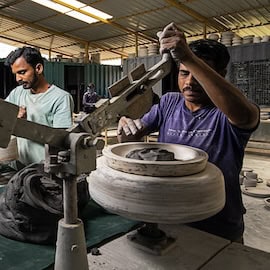In April 2020, COVID-19 had recently been declared a global pandemic, and the lockdowns that accelerated that month were wreaking havoc on economies worldwide. India was no exception: According to estimates from the Centre for Monitoring Indian Economy, over 122 million people in the country lost their jobs during the initial lockdown that month. Small traders and wage workers bore the brunt of these job losses, accounting for around 75% of those affected. However, amidst this chaos, the resilience of small businesses and the importance of supporting them became even clearer.
The pandemic posed unprecedented challenges for India’s small businesses, and Upaya’s portfolio companies were no exception. Upaya, an impact investing organization, focuses on fighting extreme poverty through job creation by investing in and supporting early-stage companies across India. Our mission is to create dignified, sustainable employment for those living in extreme poverty. Many of the businesses we work with faced imminent closure due to the combined impact of frozen capital markets, inaccessible sources of traditional funding and halted revenue streams. Recognizing the gravity of the situation, we launched the Stabilization Fund — a crucial initiative designed to protect livelihoods and keep these businesses afloat.
Our experience working with these enterprises throughout the pandemic and its aftermath highlights the crucial role impact investors can play in supporting businesses during a crisis. Below, I’ll explore the evolving funding strategies we used to help companies overcome these unprecedented challenges, and share some lessons this experience has taught us about how investors can best provide this support.
The Value of Flexible Funding Solutions in a Crisis
We launched the Stabilization Fund in June 2020, as the pandemic’s grip tightened. We knew that conventional loans, with their rigid repayment structures, would be ineffective in this unpredictable environment, so we introduced a revenue-share loan — a dynamic, performance-based model where repayments are tied directly to the company’s revenue. This was the first time we had used this novel approach, and it gave businesses the flexibility they needed to navigate the storm without the pressure of fixed repayments.
Within four months, Upaya allocated $67,000 in revenue-share loans to three companies. This funding was not merely a stopgap; it was a lifeline that allowed these enterprises to not only survive but to thrive. The companies utilized the capital for essential operational needs, including vendor payments, employee salaries and day-to-day expenses critical to maintaining the business. Even amid a challenging business environment with reduced revenue streams, this funding enabled these companies to stabilize their operations, retain their workforce and continue delivering value to their customers.
Before long, two of these companies experienced significant revenue growth that allowed them to repay their loans ahead of schedule — and shortly after the pandemic, they were even able to attract additional capital. This success highlighted the value of adaptive, innovative and timely financial solutions, demonstrating their crucial role in helping businesses thrive in the face of adversity.
Evolving Funding Strategies for Continued Support after the Pandemic
By mid-2022, as the world began to emerge from the pandemic’s shadow, we started adjusting our approach to reflect the new realities. One of our portfolio partners — a promising company in which we had already invested — was ready for a breakthrough, despite facing financial headwinds in their business. We were confident in the company’s stability and potential for growth, and decided to provide them with additional funding through the Stabilization Fund. They opted for a traditional Equated Monthly Installment (EMI) loan, in which the company would make a fixed payment amount at a specified date each month. This strategic financial support was aimed at empowering them to seize new opportunities and accelerate their growth trajectory, now that the worst of the crisis was behind them.
By this point, we had disbursed five loans under the Stabilization Fund, out of which four were repaid on time or ahead of schedule. Since the fifth company needed more support to keep their business afloat, we adapted our approach to better suit their requirements by restructuring the loan from an unpredictable revenue-share model into a graduated repayment schedule, which starts with a lower payment amount and gradually increases over time. This type of loan is well-suited for borrowers who expect their income to rise in the future. The flexibility this funding provided helped them sustain their operations, and demonstrated our unwavering commitment to supporting our portfolio businesses through their unique challenges.
The Impact of Upaya’s Stabilization Fund
Since 2011, Upaya has made equity investments in 40 small and growing businesses in India that have created more than 42,000 dignified jobs.
Under the Stabilization Fund, we have invested an additional total of $100,000 in five companies through a mix of revenue-share, fixed EMI and graduated repayment loans. This intervention played a crucial role in saving approximately 4,600 jobs during the lockdown, and the number of jobs created by these companies grew to around 7,400 post-pandemic.
These outcomes have reinforced a vital lesson: Flexibility is not merely an advantage but a necessity for businesses facing a crisis — and investors must also embrace flexibility in their support of these businesses. We saw that our typical investment strategy — convertible note financing, in which debt funding may convert into equity if the business meets certain milestones — wasn’t suited for companies navigating challenging times. By adapting our strategies and employing creative financial tools, we’ve demonstrated that timely and well-structured support can not only save businesses but also set them on a path to future success.
A Blueprint for Impact Investing During a Crisis
Upaya’s Stabilization Fund has evolved into more than just a crisis response; it has become a model for Upaya and the broader impact investing industry, showing how strategic investing can make the difference between success and failure for businesses in turbulent times.
The approaches we took are not common practices among all investors, particularly during challenging economic conditions. Investors are naturally reluctant to increase their own risks during these times, so typically, many prefer to maintain the original terms of their investments — especially if the initial structure was designed to align with specific financial goals or risk profiles. But the pandemic made it clear that a rigid insistence on maintaining these terms could backfire, putting both the enterprises, and our investments, at greater risk. Our use of revenue-share loans and willingness to transition to fixed EMIs or graduated repayment schedules when needed have proven that adaptive financial interventions can enable impact investors to drive growth even in the harshest of conditions.
As we continue to refine our strategies, our commitment remains steadfast — to create dignified jobs and support enterprises capable of making a significant impact. In the face of adversity, the resilience of these small businesses in India shines brightly. As investors, we need to build an ecosystem that supports the small and growing businesses that are vital engines of our economy — especially when crisis strikes.
Amit Choudhary is Associate Director – Finance and Investments at Upaya Social Ventures.
Photo courtesy of Upaya Social Ventures.
Publisher: Source link






